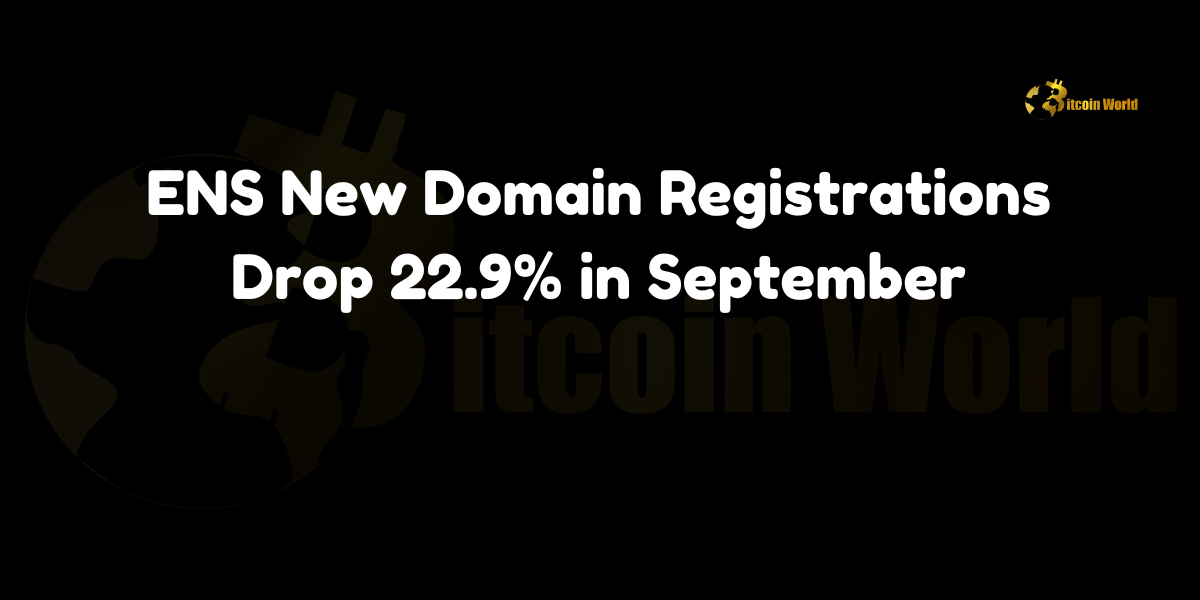ENS New Domain Registrations Drop 22.9% in September
In a noticeable shift, the Ethereum Name Service (ENS) saw a significant decline in new domain registrations during September 2024. According to Dune Analytics data, 15,569 new ENS domains were registered, reflecting a 22.9% drop compared to the 20,202 registrations recorded in the previous month of August. Despite the drop, ENS remains a crucial component of the Web3 ecosystem, with the total number of active domains now standing at 1,912,116.
The latest data also reveals that ENS has 886,738 unique user addresses, and a total of 887,331 ENS names have been set, highlighting the growing adoption of the platform despite the short-term decrease in new registrations.
What Is the Ethereum Name Service (ENS)?
ENS is a decentralized domain name service built on the Ethereum blockchain that simplifies the way users interact with blockchain addresses. Instead of relying on long, complex Ethereum wallet addresses, ENS allows users to create easily readable domain names, such as “yourname.eth,” to represent their wallet addresses, decentralized websites, or other Ethereum-based services. These .eth domains enhance user experience by providing memorable, human-readable names in place of the cumbersome strings of characters used for traditional wallet addresses.
ENS domains are more than just a naming service—they act as Web3 identities, enabling users to manage decentralized profiles, websites, and assets, all linked to their ENS names. This utility has made ENS one of the most widely used decentralized applications (dApps) in the Ethereum ecosystem.
The September Decline: What Does It Mean?
The 22.9% drop in new ENS domain registrations during September may raise questions about the current demand for ENS services. Several factors could have contributed to this decline:
Market Conditions: The broader crypto market has experienced fluctuations throughout the year, and these market conditions can impact user activity across various blockchain services, including ENS.
Summer Slowdown: Historically, the summer months, including September, often see reduced activity in various sectors, and the blockchain industry may be no exception. This seasonal effect could have played a role in the reduced number of registrations.
Increased Competition: As the Web3 space continues to grow, new decentralized identity services and naming protocols are entering the market, providing users with alternative options. While ENS remains the leader, this increase in competition may have affected new domain registration numbers.
Despite the month-over-month decline in new registrations, it is important to note that ENS continues to show significant long-term growth. The service has a solid foundation with over 1.9 million active domains and nearly 900,000 unique user addresses. These figures indicate that ENS is still a highly relevant and widely used platform in the Web3 ecosystem.
The Role of ENS in Web3
ENS is playing an increasingly important role in the development of Web3, the decentralized version of the internet built on blockchain technology. By providing users with a simple, decentralized naming system, ENS is making it easier for people to interact with decentralized applications, wallets, and blockchain addresses.
In addition to its utility in the Ethereum ecosystem, ENS is also compatible with other blockchain networks, allowing for cross-chain functionality. This interoperability makes ENS an essential tool for users navigating the complex world of decentralized finance (DeFi), non-fungible tokens (NFTs), and other Web3 applications.
The popularity of ENS domains also reflects the growing demand for digital identity in the Web3 space. As more individuals and organizations embrace decentralized technologies, having a unique, easily identifiable .eth domain will become increasingly important. ENS provides users with a secure and censorship-resistant way to manage their online identities, which will be crucial as Web3 continues to expand.
Current ENS Adoption Metrics
Even with the dip in new domain registrations, the overall adoption of ENS remains strong:
1,912,116 Active ENS Domains: The total number of active ENS domains showcases the widespread use of the platform.
886,738 Unique User Addresses: This number reflects the diversity of the ENS user base, with nearly 900,000 unique addresses registered on the platform.
887,331 ENS Names Set: The number of ENS names that have been officially set further illustrates the platform’s importance as a decentralized identity solution.
These metrics indicate that despite short-term fluctuations in new registrations, ENS is solidifying its place as the go-to service for decentralized domain names and Web3 identities.
The Future of ENS
As ENS continues to grow, it is expected to play a key role in shaping the future of digital identities in the Web3 space. The current decline in new registrations is likely a short-term dip, as ENS domains remain essential for users who want to create and manage their decentralized identities.
Looking ahead, ENS could see renewed growth with the continued expansion of decentralized applications and increased adoption of blockchain technologies by mainstream users. With Web3 gaining more attention from both individuals and institutions, the demand for ENS domains is likely to increase as more people realize the benefits of using decentralized identifiers.
Additionally, ENS’s potential to integrate with other blockchain networks and protocols positions it as a valuable asset for users seeking to navigate the multichain future of decentralized applications.
Conclusion
The 22.9% decline in new ENS domain registrations in September 2024 reflects a temporary dip in user activity, but the platform’s long-term growth and relevance in the Web3 ecosystem remain strong. With over 1.9 million active domains, 886,738 unique user addresses, and 887,331 ENS names set, ENS continues to be a critical tool for managing decentralized identities and domain names.
As the Web3 ecosystem evolves and the demand for decentralized services grows, ENS is expected to play a pivotal role in providing users with secure, human-readable, and easily manageable digital identities. The current slowdown in registrations is likely a temporary phase, with the platform well-positioned for future growth.
To learn more about the innovative startups shaping the future of the crypto industry, explore our article on latest news, where we delve into the most promising ventures and their potential to disrupt traditional industries.





